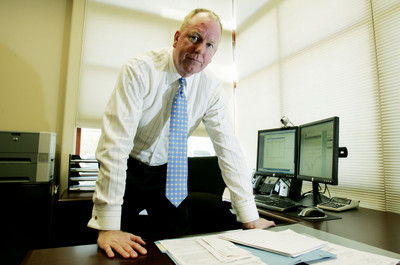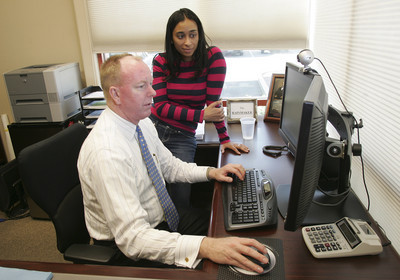Fed action sparks market
Mortgage broker Mark Baker of Meridias Capital in Las Vegas has been deluged with 50 phone calls a day from prospective borrowers, many of whom are first-time homebuyers.
He may drown with the latest action by the Federal Reserve to buy $300 billion in long-term government Treasuries. Mortgage rates, already near historical lows, were pushed even lower by the move, dropping 0.25 to 0.5 of a percentage point almost overnight.
That's good news for people looking to buy a home, Baker said.
At 5 percent interest, the total mortgage payment on a median-priced $150,000 home in Las Vegas would be $1,080 a month. Most renters are paying $800 to $1,000 a month.
The kicker, Baker said, is the $8,000 tax credit for first-time homebuyers. With Federal Housing Administration financing, buyers put down 3.5 percent on a $150,000 home or $5,250. Subtracted from the $8,000 tax credit, that would give the homebuyer $2,750 cash back on their tax return.
"That's a huge deal. We got two VA (Veterans Affairs) loans I just took today, no money down and they get the $8,000 tax credit," he said.
When Realtors were declaring, "Now's a good time to buy," six to eight months ago, that only meant they needed a paycheck, Baker said. Consumers saw through that. Now the market really has switched, he said.
If someone buys a home at $145,000, even if the value drops to $130,000, it's still not worth it to "walk away" because they're not going to find a cheaper place to live, Baker said.
Alan Schlottmann, executive director of Irvine, Calif.-based Theodore Roosevelt Institute, interprets the Fed's move as a statement that banks are not lending at the desired level. The $300 billion is the first installment in a plan to pump $1.2 trillion into the system, he said.
"It's simple. If the banks were lending to small businesses and homeowners, the Fed would not be dumping $1.2 trillion. When you cut to the chase, the credit markets are tighter than they'd like them to be," Schlottmann said. "One guy called it the Rambo approach. They're just trying to unclog the system."
In conjunction with raising the conforming loan limit, the latest piece put in place by the Fed is by far the most positive, said David Rifkind, principal and managing director of Los Angeles-based George Smith Partners, an investment firm.
"That, with a continued fall in home prices, is going to put many more people into government-backed loans, Fannie (Mae) and Freddie (Mac) and the like," he said. "One of the things that has been holding up credit is the fact that there are not many buyers of mortgage-backed securities in the secondary market."
The Mortgage Bankers Association reported 30-year fixed-rate mortgages decreased to 4.89 percent in the most recent week from 4.96 percent the previous week. The rate ties the association's survey's record low reached in January.
The Market Composite Index, a measure of mortgage loan application volume, was 876.9 in the most recent week, an increase of 21.2 percent on a seasonally adjusted basis from 723.4 one week earlier. Unadjusted, the index increased 20.7 percent compared with the previous week and 31.2 percent from a year ago.
The Refinance Index increased 29.6 percent from the previous week and the seasonally adjusted Purchase Index increased 1.5 percent. The Conventional Purchase Index increased 2.1 percent while the Government Purchase Index (largely FHA) increased 0.4 percent.
Rifkind said the outstanding stock of mortgage debt was $11.2 trillion in the third quarter and about $5 trillion of that, or 45 percent, likely fits into the category for refinancing. People with option ARMs, or adjustable-rate mortgages, that are about to reset can refinance into fixed rates near 4 percent, he said.
"That will have a stimulative effect and slow the rate of foreclosure," Rifkind said. "It's a question of time and we're in the early innings."
Baker of Meridias Capital said people shouldn't get "overly excited" about refinancing. The Fed will keep rates low for a while, he said.
"They're dying to get the loan closed by the end of the week. Why? Let's take our time and make sure we get the loan done right. Let's just get the loan approved because rates are not going up," the loan officer said. "I think rates could go a smidgen lower."
Contact reporter Hubble Smith at hsmith@reviewjournal.com or 702-383-0491.























